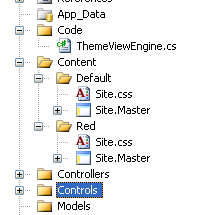本文转自:http://www.codeproject.com/Articles/32847/ASP-NET-MVC-Dynamic-Themes
Introduction
I really needed to enable themes for my application, and I found an interesting article about it by Chris Pietschmann. In my point of view, the only problem with his approach is that you need to repeat each page for all themes. Well, I only want to create one page per theme, and have a master page and CSS files for each theme.
Using the code
For this project, I made some assumptions:
- The master page for each theme has the name Site.Master.
- The master page file and CSS files will be placed on a folder with the name of the theme.
- All the theme folders will be placed in the Content folder.
The file structure will be like this:

Now, let’s write a custom View Engine that will inherit from WebFormViewEngine. This code is only a sketch of what I want to implement. For instance, I want to save the user theme selection so that, in the next login, the user has his option set.
 Copy Code
Copy Codepublic class ThemeViewEngine : WebFormViewEngine
{
public ThemeViewEngine()
{
base.ViewLocationFormats = new string[] {
"~/Views/{1}/{0}.aspx",
"~/Views/{1}/{0}.ascx",
"~/Views/Shared/{0}.aspx",
"~/Views/Shared/{0}.ascx"
};
base.MasterLocationFormats = new string[] {
"~/Content/{2}/Site.master"
};
base.PartialViewLocationFormats = new string[] {
"~/Views/{1}/{0}.aspx",
"~/Views/{1}/{0}.ascx",
"~/Views/Shared/{0}.aspx",
"~/Views/Shared/{0}.ascx"
};
}
public override ViewEngineResult FindView(ControllerContext controllerContext,
string viewName, string masterName)
{
if (controllerContext == null)
{
throw new ArgumentNullException("controllerContext");
}
if (string.IsNullOrEmpty(viewName))
{
throw new ArgumentException("Value is required.", "viewName");
}
string themeName = this.GetThemeToUse(controllerContext);
string[] searchedViewLocations;
string[] searchedMasterLocations;
string controllerName =
controllerContext.RouteData.GetRequiredString("controller");
string viewPath = this.GetViewPath(this.ViewLocationFormats, viewName,
controllerName, out searchedViewLocations);
string masterPath = this.GetMasterPath(this.MasterLocationFormats, viewName,
controllerName, themeName, out searchedMasterLocations);
if (!(string.IsNullOrEmpty(viewPath)) &&
(!(masterPath == string.Empty) || string.IsNullOrEmpty(masterName)))
{
return new ViewEngineResult(
(this.CreateView(controllerContext, viewPath, masterPath)), this);
}
return new ViewEngineResult(
searchedViewLocations.Union<string>(searchedMasterLocations));
}
public override ViewEngineResult FindPartialView(ControllerContext controllerContext,
string partialViewName)
{
if (controllerContext == null)
{
throw new ArgumentNullException("controllerContext");
}
if (string.IsNullOrEmpty(partialViewName))
{
throw new ArgumentException("Value is required.", partialViewName);
}
string themeName = this.GetThemeToUse(controllerContext);
string[] searchedLocations;
string controllerName = controllerContext.RouteData.GetRequiredString("controller");
string partialPath = this.GetViewPath(this.PartialViewLocationFormats,
partialViewName, controllerName, out searchedLocations);
if (string.IsNullOrEmpty(partialPath))
{
return new ViewEngineResult(searchedLocations);
}
return new ViewEngineResult(this.CreatePartialView(controllerContext,
partialPath), this);
}
private string GetThemeToUse(ControllerContext controllerContext)
{
if (controllerContext.HttpContext.Request.QueryString.AllKeys.Contains("theme"))
{
string themeName = controllerContext.HttpContext.Request.QueryString["theme"];
controllerContext.HttpContext.Session.Add("Theme", themeName);
}
else if (controllerContext.HttpContext.Session["Theme"] == null)
{
controllerContext.HttpContext.Session.Add("Theme", "Default");
}
return controllerContext.HttpContext.Session["Theme"].ToString();
}
private string GetViewPath(string[] locations, string viewName,
string controllerName, out string[] searchedLocations)
{
string path = null;
searchedLocations = new string[locations.Length];
for (int i = 0; i < locations.Length; i++)
{
path = string.Format(CultureInfo.InvariantCulture, locations[i],
new object[] { viewName, controllerName });
if (this.VirtualPathProvider.FileExists(path))
{
searchedLocations = new string[0];
return path;
}
searchedLocations[i] = path;
}
return null;
}
private string GetMasterPath(string[] locations, string viewName,
string controllerName, string themeName, out string[] searchedLocations)
{
string path = null;
searchedLocations = new string[locations.Length];
for (int i = 0; i < locations.Length; i++)
{
path = string.Format(CultureInfo.InvariantCulture, locations[i],
new object[] { viewName, controllerName, themeName });
if (this.VirtualPathProvider.FileExists(path))
{
searchedLocations = new string[0];
return path;
}
searchedLocations[i] = path;
}
return null;
}
}
To finish this sample, just change the global.asax, removing all engines from the View Engine and adding the custom one:
protected void Application_Start()
{
RegisterRoutes(RouteTable.Routes);
ViewEngines.Engines.Clear();
ViewEngines.Engines.Add(new ThemeViewEngine());
}
Well, hope that’s useful.
License
This article, along with any associated source code and files, is licensed under The Code Project Open License (CPOL)